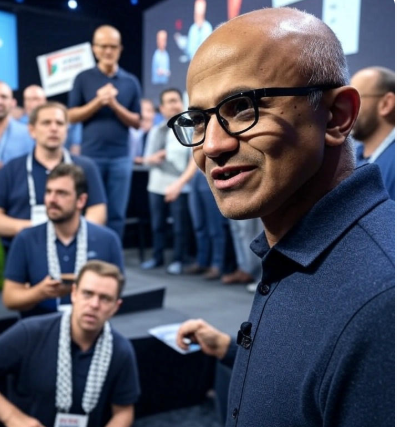On May 19, 2025, Microsoft’s annual Build developer conference in Seattle was momentarily disrupted when Joe Lopez, a firmware engineer working on the company’s Azure cloud platform, interrupted CEO Satya Nadella’s keynote speech. Shouting “Free Palestine” and accusing Microsoft of enabling Israeli war crimes through its Azure technology, Lopez’s protest brought a charged geopolitical issue to the forefront of one of the tech industry’s most prominent stages. This incident, reported by The Guardian, is part of a growing wave of activism within the tech sector, where employees are increasingly vocal about their companies’ roles in global conflicts, particularly the Israeli-Palestinian conflict. As artificial intelligence (AI) and cloud computing become integral to modern warfare, the ethical responsibilities of tech giants like Microsoft are under intense scrutiny. This blog post explores the context of the protest, the allegations against Microsoft, and the broader implications for the tech industry.
The Build 2025 Protest: A Moment of Disruption
The Build 2025 conference was meant to showcase Microsoft’s latest advancements in AI and cloud computing, with Nadella’s keynote setting the tone for the event. However, minutes into his speech, Lopez’s outburst shifted the focus. “Satya, how about you show how Microsoft is killing Palestinians,” he shouted, referencing Azure’s alleged role in Israeli military operations. Lopez, a four-year veteran of Microsoft’s Azure Hardware Systems team, was quickly escorted out by security, but not before sending an all-staff email explaining his actions. In it, he expressed horror at the “ongoing genocide in Gaza” and criticized Microsoft’s complicity through its technological support for Israel.
The protest wasn’t an isolated incident. It was organized in coordination with No Azure for Apartheid (Noaa), a worker-led group that has been campaigning against Microsoft’s AI and cloud contracts with the Israeli military for over a year. Noaa’s efforts align with the broader No Tech for Apartheid movement, which also targets companies like Google and Amazon for similar ties. The timing of the protest, just days after Palestinians marked 77 years since the Nakba—the 1948 displacement of 750,000 Palestinians—added emotional and historical weight to the demonstrators’ message.
Azure and the Israeli Military: The Core Allegations
At the heart of the protest are allegations that Microsoft’s Azure cloud platform enables Israeli surveillance and military operations in Gaza and the West Bank. According to reports from The Guardian and other sources, Azure has been used by Israel’s Ofek Unit, which manages databases for airstrike targets, and in systems like “Rolling Stone,” which tracks Palestinian movement and population registries. Leaked documents cited by +972 Magazine suggest Microsoft has a significant presence in Israel’s military infrastructure, with its cloud services supporting combat and intelligence activities across the Israeli Defense Forces (IDF).
These claims are part of a broader narrative about the role of AI and cloud computing in modern warfare. The IDF’s use of AI-driven tools, such as “The Gospel” and “Lavender,” has been criticized for automating target selection, allegedly contributing to high civilian casualties in Gaza. Since October 2023, when Hamas’s attack on Israel killed 1,200 people and triggered Israel’s military response, over 50,000 Palestinians have reportedly died, according to Gazan health officials. Critics argue that tech companies providing infrastructure for these operations bear moral responsibility for their outcomes.
Microsoft, however, maintains that its relationship with the Israel Ministry of Defense (IMOD) is a “standard commercial relationship.” Following an internal review and an external assessment, the company stated it found no evidence that its Azure or AI technologies have been used to harm people or violate its AI Code of Conduct. This response has done little to quell the concerns of activists like Lopez, who argue that the scale of data stored on Azure—potentially including surveillance data—facilitates human rights violations.

The Growing Tide of Tech Worker Activism
Lopez’s protest is the latest in a series of employee-led actions at Microsoft and other tech giants. In April 2025, Microsoft’s 50th anniversary celebration was disrupted by similar protests, with employees accusing AI CEO Mustafa Suleyman of being a “war profiteer” and condemning the company’s ties to Israel. These actions echo earlier demonstrations, such as a February 2025 town hall where employees wore T-shirts spelling out, “Does Our Code Kill Kids, Satya?” and a 2023 vigil for Palestinian victims.
This activism reflects a broader trend in the tech industry. At Google, employees have faced firings for protesting cloud contracts with Israel, and the Boycott, Divest, Sanctions (BDS) movement added Microsoft to its boycott list in April 2025, citing its technological support for the IDF. Tech workers, once seen as apolitical cogs in the corporate machine, are increasingly leveraging their insider positions to challenge their employers’ ethical stances. For many, the anonymity of corporate contracts—where individual contributions to military projects are obscured—fuels frustration. As one former Microsoft engineer, Hossam Nasr, told The Guardian, the situation at the company is “very close to a tipping point.”
Ethical Dilemmas in AI and Cloud Computing
The Build 2025 protest raises profound questions about the ethical responsibilities of tech companies in an era where AI and cloud infrastructure are ubiquitous in both civilian and military contexts. Unlike traditional weapons manufacturers, tech giants like Microsoft operate in a dual-use landscape, where the same tools powering productivity apps are used in surveillance and warfare. This duality complicates accountability. Employees like Lopez may work on Azure without directly engaging with military contracts, yet their contributions indirectly support systems used in conflict zones.
The debate also touches on transparency. Microsoft’s claim of a “standard commercial relationship” with Israel contrasts with employee demands for full disclosure of its military ties. Activists argue that without transparency, it’s impossible to assess whether Microsoft’s technology complies with international humanitarian law. The company’s internal review, conducted with an unnamed external firm, has been criticized as insufficient by groups like Noaa, who demand an independent audit.
Implications for the Tech Industry
The Build 2025 protest underscores a pivotal moment for the tech industry. As AI and cloud computing become integral to global security, companies like Microsoft face growing pressure to align their practices with ethical principles. The No Tech for Apartheid movement, supported by thousands of tech workers, signals that employees are no longer willing to remain silent. Boycotts, resignations, and public protests could damage corporate reputations and financial performance, as Lopez warned in his email: “The world has already woken up to our complicity and is turning against us.”
For Microsoft, the path forward is fraught. Balancing commercial interests with ethical considerations requires navigating complex geopolitical realities. The company’s leadership has emphasized open channels for employee feedback, but incidents like the Build protest suggest these avenues are inadequate for addressing deep-seated concerns. Meanwhile, competitors like Google and Amazon face similar scrutiny, indicating an industry-wide reckoning.
Conclusion: A Call for Accountability
Joe Lopez’s protest at Build 2025 was more than a disruption; it was a call to examine the role of technology in shaping global conflicts. As AI and cloud platforms become tools of war, tech companies must confront their responsibilities head-on. Transparency, independent audits, and robust ethical frameworks are essential to ensure that innovation does not come at the cost of human lives. For now, the voices of employees like Lopez and groups like No Azure for Apartheid are pushing the industry toward accountability, one protest at a time.
Sources: The Guardian, May 19, 2025; The Verge, May 19, 2025; +972 Magazine



